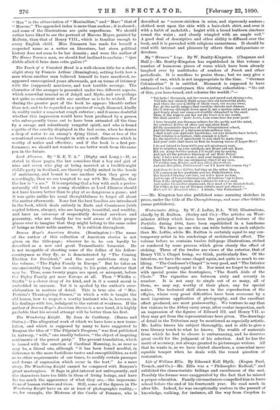The Wandering Knight. By Jean de Cartheny. (Burns and Oates.)—The
allegorical work of which we have here a new trans- lation, and which is supposed by many to have suggested to Bunyan the idea of " The Pilgrim's Progress," was first published in Antwerp, "with," one readily believes, "the object of inspiring sentiments of the purest piety." The present translation, which is issued with the sanction of Cardinal Manning, is, as near as may be, a literal one, although " it has been found needful, in deference to the more fastidious tastes and susceptibilities, as well as to other requirements of our times, to modify certain passages and forms of expression which occur in the text." As a mere .story, The Wandering Knight cannot be compared with Bunyan's great masterpiece. It flags in plot-interest not unfrequently, and the characters have too little in them of living beings, and have far too much the appearance of what they are,—the impersona- tions of human virtues and vices. Still, some of the figures in The Wandering Knight have an air at least of photographic reality,— as, for example, the Mistress of the Castle of Penance, who is
described as " sorrow-stricken in mien, and rigorously austere ; clothed next upon the skin with a hair-cloth shirt, and over it with a habit of sackcloth ; begirt with a broad leathern cincture round the waist ; and closely wimpled with an ample veil." A good deal of descriptive and other ability is diffused over the book, and it is pervaded with religious earnestness. It should be read with interest and pleasure by others than antiquarians or devotees.






































 Previous page
Previous page